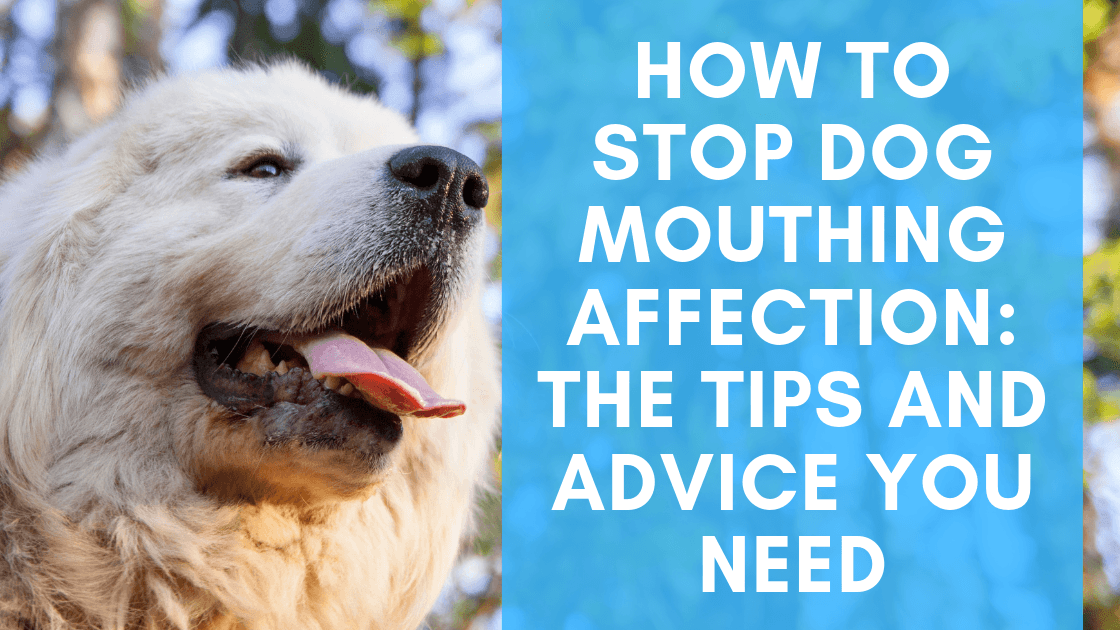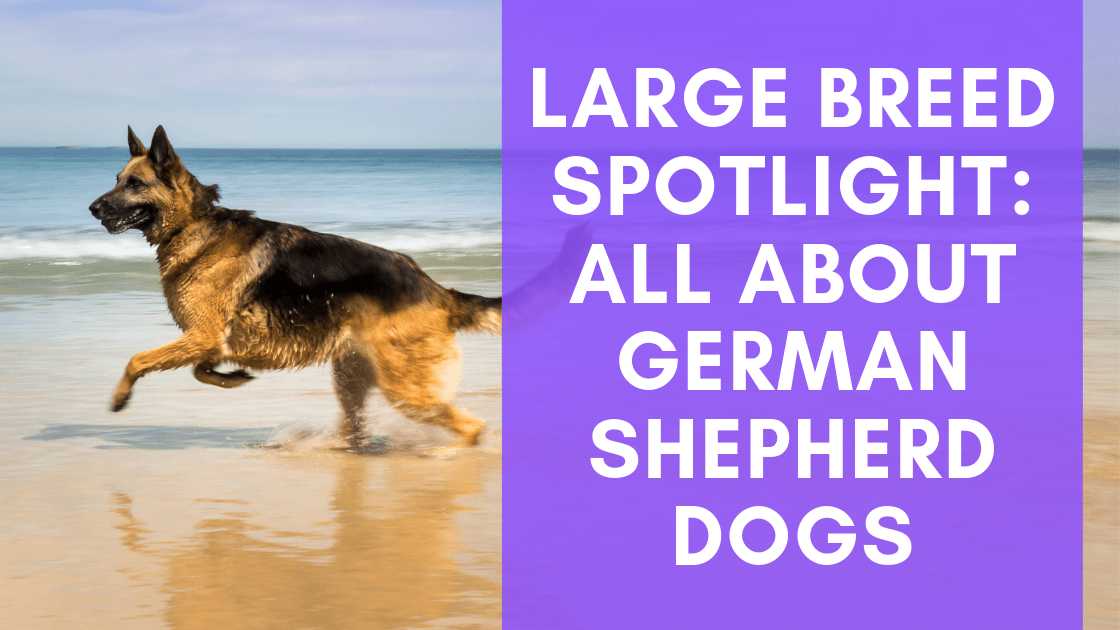Does your dog always seem to be putting its mouth on you lately? Maybe you have a puppy and the mouthing has recently kicked up a notch. Or, you’ve got an adult dog that seems to mouth you affectionately every time you arrive home, are focused on another task, or during play.
You see, dogs use their mouths as a way to explore the world and learn social cues from humans and other dogs. You might unknowingly be reinforcing your dog’s mouthing affection, and wiring their brain to think mouthing affection = attention from their humans.
Read on to learn more about mouthing affection behavior. You’ll find out what it is, why dogs engage in this behavior when your dog’s affectionate mouthing could be a red flag, and how to curb it once and for all.
What is dog mouthing affection?
Dog mouthing affection is a term used to describe when your puppy or dog puts their mouth on you in a non-aggressive way. You might feel your dog’s teeth, but there is no pressure behind their mouthing
In a puppy, dog mouthing affection might involve a little more tooth, so to speak. And in both puppy and adult dog’s mouthing affection also refers to a dog using their mouth gently to pull at your clothes, shoes, or items as a means to try to engage in play or gain attention.
Why do dogs mouth people?
It’s never easy to determine the why behind our dog’s behavior 100%, but at least trying to understand why can help you address the problem with greater success.
I mentioned that dogs use their mouths as a way to understand the world. Because they don’t have hands to manipulate their environment and don’t speak our language, their mouths become their main tools.
Puppies and mouthing affection
No dog owner can escape the puppy phase without some degree of mouthing affection. Your puppy is likely mouthing you because they are excited and want to engage in play. Puppies intrinsically play with their littermates and other dogs using their mouths, so why shouldn’t they do this with you, too?
Puppies are also still learning social cues, so they use their mouths to test out reactions. Puppies might exhibit more variation in mouthing pressure and to what they mouth. They want to see how their mouthing behavior affects your reaction. Then they learn and plan accordingly.
For example, your puppy might think: “Oh, when I pulled at your pant leg while you were working on the computer, you stopped what you were doing and gave me undivided attention.”
Like addressing most common dog behavior problems, curbing mouthing affection when your dog is still a puppy is best because it can be harder to break the behavior of an adult dog. Below, we’ll talk about specific strategies.
Related reading: How to Survive the Puppy Chewing Phase
Adult dogs and mouthing affection
If you have an adult dog that is especially mouthy, I’m willing to bet it’s in one of two situations. Either when they are very excited and stimulated, or as a way to get attention when they are being ignored or need their needs met.
Pinpointing the scenarios where your dog most often mouths will help you in your approach to stop the behavior.
Playful, excited behavior in adult dogs
Some adult dogs just haven’t learned an alternative to mouthing affection when they are excited or playing. The dog who mouths when they are feeling excited to playful most often mouths when you first arrive home, when visitors arrive, or in the middle of a play session when they already have your attention.
In this case, your dog’s mouthing is just their way of playing and showing excitement. Dogs’ natural social behavior involves a lot of mouthing, so if they aren’t taught otherwise they will do this to humans as well.
Manipulative, attention-seeking behavior in adult dogs
Other adult dogs have learned through reinforcement that if they use mouthing affection behavior on their owners they suddenly have their full attention. Whether the attention you are giving them is positive or negative, it got you to engage with them fully, which was their goal.
If your dog is using mouthing affection for attention, they are probably mouthing you when you are engaged in another task or their needs have not been met. Your dog might fall into the habit of mouthing you to ask for dinner, to go outside, or to let you know they need more exercise or stimulation.
Related reading: Why is My Older Dog Suddenly Chewing?
Is dog mouthing an aggressive behavior?
In general, dog mouthing is not a red flag for aggressive behavior. Dog mouthing affection is very common and if you look at the descriptions above, you can likely easily pinpoint the situations when your dog most often mouths.
If your dog’s mouthing starts to involve more pressure, or seems more like a ‘warning bite’, then it’s important to take precaution. With the exception of puppies, your dog is well aware of how much pressure they are exhibiting and the message they are trying to send with their mouth.
If you have any doubt that your dog’s mouthing affection might be indicative of aggressive behavior get in touch with a trainer or behavior specialist right away. It’s much easier to get a handle on aggressive behavior in the earlier stages and you might avoid an accident from happening.
How can I stop my dog’s mouthing affection?
Like stopping most unwanted dog behaviors, you want to take a positive and consistent approach to curb your dog’s mouthing affection. Keep in mind that you won’t see results right away, but the consistency of your reaction and training is what will “rewire” the behavior, so to speak.
And, I can never talk about unwanted dog behavior without the added caveat to assess your dog’s environment and needs. Is your dog getting the exercise and stimulation their body needs and deserves? Are they given enough opportunity to engage in social play either with other dogs (like at the dog park) or with you? It’s always worth revisiting these basics to ensure greater success with any training goal.
Replace the mouthing behavior with something else
The best approach to stopping mouthing behavior is to replace the behavior with something else. You can achieve this by putting a toy into your dog’s mouth whenever they start mouthing you. Whether your dog mouths because they are excited, or to get your attention, they will begin to engage in these behaviors by first putting a toy in their mouth.
Having a dog greet you or visitors with a toy in their mouth instead of with uncomfortable mouthing is a huge improvement. You can’t stop their excitement, but you can channel it in a new way.
The same goes for attention-seeking. While you might want the behavior to go away entirely, this might not be realistic. But having your dog bring a toy to you is a lot more positive and less frustrated than being mouthed anytime they want something.
Tips to succeed with this approach:
It’s important that you have toys in an easily accessed place for your dog. At first, you will be the one putting the toy in their mouth.
- This might mean carrying a toy with you to put in their mouth right when you arrive home or keeping a toy next to you when you are working on the computer, etc.
- With time, your dog will fill their mouth with a toy on their own.
- Set them up for success with this by creating a toy bin or basket that is always in the same place in the house.
- Consistency with all family members and visitors. For this approach to work, no one can tolerate the mouthing behavior. Everyone should be on board and know the plan to put something in your dog’s mouth the second they start to mouth
- Praise your dog when they keep something in their mouth! Let them know this is what you want
Related reading: Choosing the Safest Dog Toys, How to Get Your Dog to Stop Jumping Up
Ignore the behavior to avoid reinforcement
Another approach to replacing the behavior is ignoring the behavior. In this case, you would remove yourself from the room for 10-30 seconds when mouthing behavior occurs, or “become a tree” and wait to engage with your dog until they give up the behavior.
This can be trickier to do consistently and well, especially if the root cause of the problem is attention-seeking. This is because it’s very easy to inadvertently give your dog attention even when you’re trying to ignore.
Your best bet might be a combination of the two solutions and using your best judgment of the scenarios that require ignorance vs. replacement.
Stop the dog mouthing affection once and for all
Once you understand the root of your dog’s mouthing and with the tips for curbing the behavior discussed above, your dog can learn to live without mouthing you.
Try to be realistic and be sure that your dog’s other needs are being met before getting too frustrated by their mouthing (especially if it’s attention-seeking). Remember to stay patient and consistent with your approach.
It will take time to break such an intrinsic behavior in your dog, but you’ll get there!
Have another tip or need specific advice for your situation? Drop a comment below.


